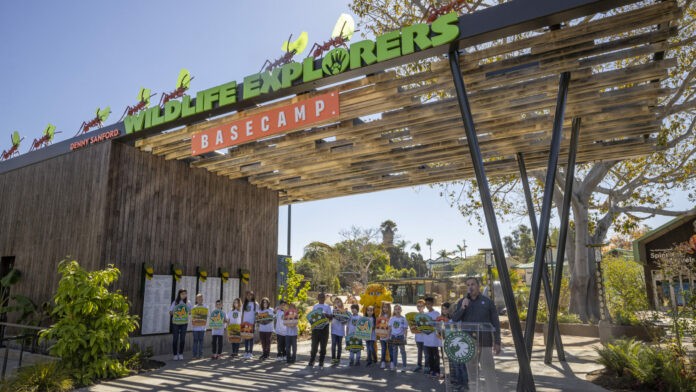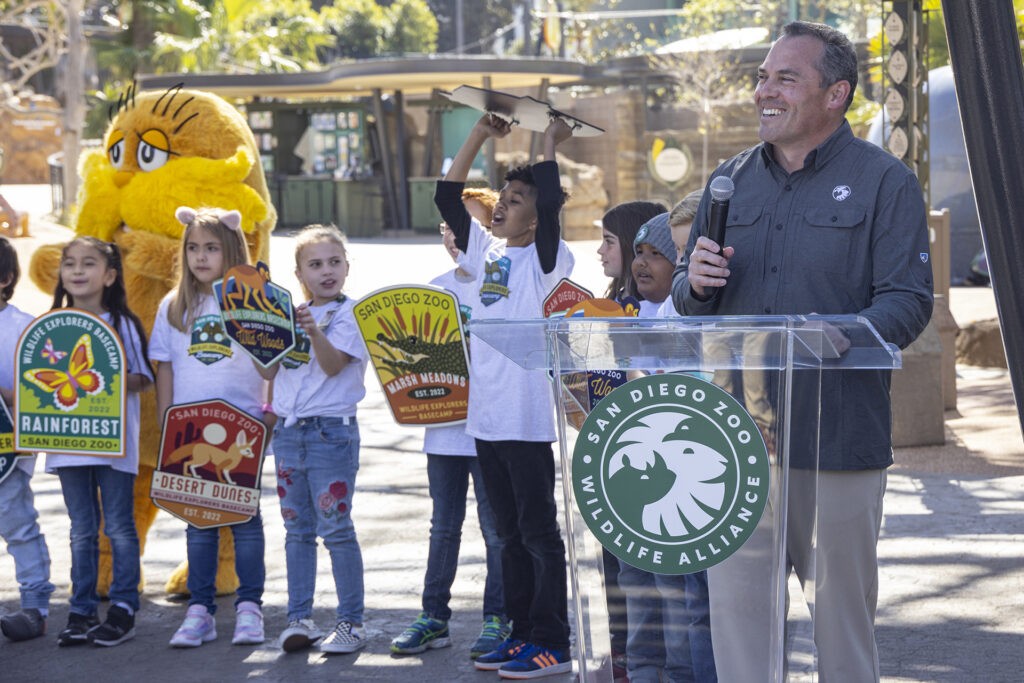Paul A. Baribault, president and chief executive officer of San Diego Zoo Wildlife Alliance, along with a group of San Diego Zoo Wildlife Alliance team members, youth from across San Diego and Dr. Seuss’ The Lorax, joined in a festive opening ceremony welcoming guests into the new Denny Sanford Wildlife Explorers Basecamp.
Built on the site of the former Children’s Zoo, Wildlife Explorers Basecamp is a 3.2-acre multi-ecosystem experience designed to provide guests of all ages with an up-close look at nature and offer fresh, high-tech interactive opportunities that nurture empathy for wildlife and encourage future caretakers of the planet. Inside Basecamp, Zoo guests will visit with a variety of fascinating species and engage on a deeper level by utilizing full sensory and multifaceted elements, including “parallel play” opportunities from climbing and crawling around a massive tree house, to exploring through water play elements; experiencing interactive touch screen games, using microscopes to reveal natural wonders, and specialized animation that utilizes artificial-intelligence (AI), dynamic lighting and whole-room scented environments.
“Wildlife Explorers Basecamp speaks to the budding conservationist within us all and shows us the marvels of the natural world,” said Baribault. “Through these gates millions of world changers will begin their journey with nature and demonstrate the power of empathy and compassion as they join us to become allies for wildlife”.
Wildlife Explorers Basecamp encompasses eight buildings and habitats dispersed throughout four zones, featuring wildlife that live in these ecosystems: Rainforest, Wild Woods, Marsh Meadows and Desert Dunes.
The Rainforest zone is centered around the 10,000-square-foot McKinney Family Spineless Marvels building, where guests will experience invertebrates — including crustaceans, arachnids and insects — such as leafcutter ants, spiders, scorpions, stick insects and more. Inside, there is a pollinator experience with giant beeswax-fragrant honeycombs and an observation pane that gives guests the chance to see the workings of a real-life beehive. The projected migration flyover encounter showcases various insects, including migrating monarch butterflies, grasshoppers and dragonflies as part of a large meadow scene that curves along walls and encompasses a domed ceiling.
The Wild Woods area offers guests the chance to visit with unusual wildlife species, such as coatis and squirrel monkeys, which are both native to Central and South America. The space features the striking Prebys Foundation Discovery Bridge and a 20-foot-tall Tree of Dreams — a tree house designed as an ancient oak. This dynamic and detailed nature-play tree provides multiple points of access for guests — from a suspension bridge and net tunnel to a spiral staircase — and a parallel play experience to the squirrel monkeys that live in the adjacent habitat. Water play is another focus of this woodland-themed zone, which includes a waterfall that flows into a gentle meandering stream, an exhilarating splash pad, unpredictable water jets, and a bluff area with a boulder scramble made to encourage exploration.
Marsh Meadows aims to evoke a sense of visiting marsh-like habitats, including swamps and estuaries. The pathway through this area was designed to help convey a sense that guests are inhabiting the marsh along with frogs, fish and other wildlife that lives there. The central hub of Marsh Meadows is the Art and Danielle Engel-funded Jake’s Cool Critters building — a two-story herpetology and ichthyology structure with more than 7,000 square feet of immersive environments, digital media, learning opportunities and educational classroom spaces, created to engage wildlife explorers of all ages. The wildlife here includes snakes, amphibians, crocodilians, turtles and lizards, including endangered Fijian iguanas.
At the nearby Rady Ambassadors Headquarters, guests will meet wildlife from all over the planet, including a two-toed sloth and a prehensile-tailed porcupine, and learn more about how everyone can help conserve them in their native habitats.
Finally, Desert Dunes, a dry desert wash-themed area, offers fun boulder play prospects for climbing, scrambling, hopping and more. Reptile sculptures and petroglyphs can be found among the rocks, while cool caves provide shaded areas where guests can beat the heat, like their desert wildlife counterparts—including the fennec fox, prairie dog and burrowing owl. Conservation is at the forefront in the design of Wildlife Explorers Basecamp, as builders worked to incorporate advanced sustainable materials throughout. A portion of the Spineless Marvels building was made with ethylene tetrafluoroethylene (ETFE) — a fluorine-based plastic that is created to be more resistant to corrosion. The system is 100% recyclable and consists of a series of custom-sized Teflon multilayered “air pillows” — which, when filled with air, provide solar insulation while also reducing the need for artificial lighting. The Zoo’s talented horticulture team worked to identify more than 100 trees from the previous habitat to preserve and replant within Basecamp.







